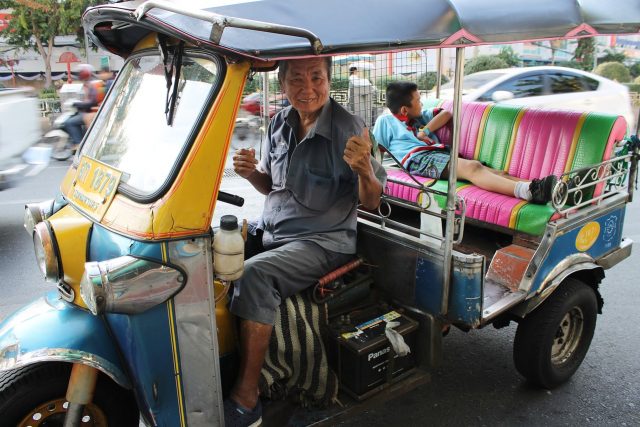
A wave of electric tuk-tuks could soon hit Bangkok’s streets if the Electric Vehicle Association of Thailand (EVAT) gets its way. The organization has urged Thailand’s Land Transport Department to allow for the new registration of the popular ride in an attempt support efforts to get more electric tuk-tuks on the road.
Current tuk-tuk laws dictate that registration fall under either personal use and public transportation. This means a person or company wanting to get their tuk-tuk registered must list the purpose of use to the Land Transport Department. Approval decisions are then decided subjectively instead of based on any set criteria.
According to Yossapong Laoonual, EVAT President, this makes the process too complicated and restrictive when compared to registering other vehicles in Thailand. Additionally, new tuk-tuks cannot be registered in Bangkok. However, the three-wheel vehicles can still be registered in other provinces.
In the Thai capital, tuk-tuk owners are forced to buy old number plates that have no expiry date. All the hassle means manufacturing firms have no incentive to build electric tuk-tuks because demand for them is limited, especially in Bangkok where they are most popular.
“As a result, regulations for tuk-tuks cause many obstacles to run an assembly business for both fuelled and electrified tuk-tuks,” Yossapong told the Bangkok Post. “Our request is to revise the laws to cope with the current situation; meanwhile, tuk-tuks are an iconic and popular vehicle of Thailand to promote the country’s tourism sector.”
Currently, most tuk-tuks made in Thailand are exported. However, Yossapong believes that if registration were relaxed, demand for electric tuk-tuks would increase. This would in turn be a boon for production.
“Earlier the EVAT talked with two ministries, the Transport Ministry and the Tourism and Sports Ministry, to consider measures enabling tuk-tuk operation for public and private use, aiming to promote electric tuk-tuks for eco-tourism,” Yossapong noted.

































